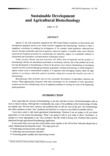Sustainable Development and Agricultural Biotechnology
JIRCAS international symposium series
| ISSN | 13406108 |
|---|---|
| 書誌レコードID(総合目録DB) | AA1100908X |

本文フルテキスト
intlsymp-12_141-146.pdf188.03 KB
Agenda 21, the work programme adopted by the 1992 United Nations Conference on Environment and Development (popularly known as the "Earth Summit") suggested that biotechnology "promises to make a significant contribution in enabling the development of, for example, better healthcare, enhanced food security through sustainable agricultural practices, improved supplies of potable water, more efficient industrial development processes for transforming raw materials, support for sustainable methods of afforestation and reforestation, and detoxification of hazardous wastes."
Today, poverty, disease and food insecurity still afflict most of humanity and the promise of biotechnology still has not materialized, particularly in developing countries. Part of the problem lies in the fact that development in biotechnology is driven by the private sector whereas biotechnology in developing countries has been promoted through government programmes. Existing biotechnology is mainly designed to address market needs in industrialized countries. It is imperative that developing countries adopt the right policies in accordance with their national priorities, taking into account the benefits and risks of biotechnology.
Biotechnology offers powerful tools for the sustainable development of agriculture, fisheries and forestry. When appropriately integrated with other technologies for the production of food, agricultural products and services, biotechnology can be of significant assistance in meeting the needs of the burgeoning global population.
Today, poverty, disease and food insecurity still afflict most of humanity and the promise of biotechnology still has not materialized, particularly in developing countries. Part of the problem lies in the fact that development in biotechnology is driven by the private sector whereas biotechnology in developing countries has been promoted through government programmes. Existing biotechnology is mainly designed to address market needs in industrialized countries. It is imperative that developing countries adopt the right policies in accordance with their national priorities, taking into account the benefits and risks of biotechnology.
Biotechnology offers powerful tools for the sustainable development of agriculture, fisheries and forestry. When appropriately integrated with other technologies for the production of food, agricultural products and services, biotechnology can be of significant assistance in meeting the needs of the burgeoning global population.
| 作成者 | A.H. Zakri |
|---|---|
| 公開者 | Japan International Research Center for Agricultural Sciences |
| オンライン掲載日 | |
| 号 | 12 |
| 開始ページ | 141 |
| 終了ページ | 146 |
| 言語 | eng |
